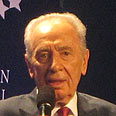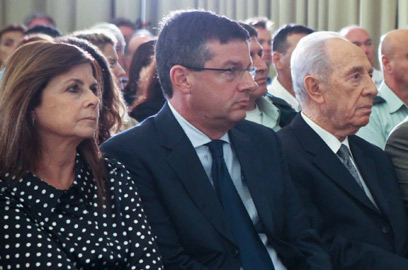
Peres: I kissed Rabin goodbye
Israel marks 15 years since former prime minister's assassination. In special ceremony at his residence, president recounts night of November 4, 1995. 'Murder must not be forgiven or forgotten,' he says
President Shimon Peres on Tuesday afternoon launched the memorial events marking the 15th anniversary of former Prime Minister Yitzhak Rabin's murder.
During the ceremony he spoke of the friendship and disagreements with the man he had known for more than 50 years. He recounted the peace rally on November 4, 1995 and how he bid farewell to Rabin at the Sourasky Medical Center in Tel Aviv..
The ceremony was attended by the Rabin family members, Defense Minister Ehud Barak, senior public figures, youth movement members and students. A family representative was also expected to speak at the event.
"From the foots of Mount Sinai to the slopes of Rabin Square, one commandment stands high throughout all generations: Thou shall not kill. Thou shall not kill a person. Thou shall not kill an idea," Peres said at the start of his speech.
"The murder is a crime which must not be forgiven or forgotten. We are holding a memorial evening because we must fight forgetfulness. Such forgetfulness is the enemy of man. It's also puts democracy in danger."
Peres during ceremony (Photo: Noam Moskowitz)
Peres said Rabin was not afraid of the road he had taken. "Yitzhak knew that a leader does not rest on the laurels of yesterday. He leads according to a vision. He knew that in today's revolutionary reality, one who takes his time endangers himself. One who dares reaches distant and strong places.
"Yitzhak was not afraid of the future. He knew there was no escape, that it must be met face-to-face… Yitzhak was determined to move forward towards peace, while aware of the internal and external difficulties."
He went on to discuss the atmosphere at the peace rally which ended with Rabin's assassination. "The rally was aimed at estimating the peace camp's support. There were hesitations. Yitzhak himself felt the growing waves of hatred against him. His pictures wearing a kaffiyah (traditional Arab headdress) were seen in many corners across the country.
"Even during an innocent visit to the Wingate Institute he was booed, and nearly physically attacked. A man who was a complete patriot, who represented security, who represented peace, who was filled with dedication for the people. a brave leader making difficult, bitter decisions, knowing that incomplete peace was better than no peace.
"On the eve of the rally we agreed to get on and off the stage together. It was a true declaration of unity in the face of raging violence."
'We couldn't believe our eyes'
As for the rally itself, he said: "After we ascended the balcony of the municipality building, we couldn't believe our eyes. Young people were chanting, 'Rabin, Rabin. Peace, peace.' Under the balcony youths were jumping into the pool, while chanting, 'Rabin, Rabin.'
"Yitzhak was surprised by the level of enthusiasm, the magnificent spontaneity no one could have pre-organized. It was a flow of love from the people. We were all swept away by that great spirit. I heard him sing for the first time. I felt a friendly, moving embrace for the first time. It was as if peace was standing proud again. Before the end of the rally, the security guards asked us to get off the balcony separately."

With Rabin's daughter Dalia and son Yuval (Photo: Noam Moskowitz)
According to Peres, the reason for the request was a warning that they would be targeted by Jihad men. "So I went down the stair on my own. Yitzhak's car was parked before mine. Damti (the driver) was standing at its door. I turned my head and saw Yitzhak coming down the stairs.
"When I got in the car I heard faint sounds. Before I could understand what was going on, the security guards pushed me into the car and began driving fast towards a safe facility. I asked them, 'What happened? Where is Yitzhak?' They kept silent. Only several moments later they informed me that he was on the way to the hospital."
'The nation lost its father'
Peres said he asked his guards to take him to hospital immediately, but they refused. "I told them I would get out of the car and walk, so they agreed to drive me to the hospital. The hospital was filled with silence and anxiety, and endless concern. Eyes were filled with tears, lips were praying. The hospital director came up to me and whispered in my ear, 'Unfortunately, Yitzhak is gone.' I went over to Leah (Rabin's wife) and gave her the dreadful news."
The president spoke about seeing Rabin's body. "Leah and I entered the room Yitzhak was lying in together. On his face I saw a calmness I had never seen before. I kissed him goodbye. Leah remained alone with him. I was shocked and broken. Everyone's face was gloomy. Tears were running down our faces.
"The people began gathering around the hospital in masses. They felt orphaned. Thousands of candles were lit, their flames shining with tears. Those moments the nation felt like it had lost its father. The tears didn't dry up. The candles weren't put out. Tonight we return to the oath concealed in our hearts: We shall not forget his image, we shall not bid farewell to his path. Peace is his testament."
Rabin's son, Yuval, spoke about the remembrance. "Every year we learn that time doesn’t heal. There are many who don't want to let the man and the murder fade away. I have no doubt that the personal memories will accompany us for many years.
"Still, the reality is the same reality and the questions are the same questions and the answers are still absent. So instead of asking or deliberating, I would like to clarify how I would like him to be remembered. He was true and honest, a man of talent and many good traits, but he also had his shortcomings. I would like him to be judged according to his deeds and accomplishments."
He added that the criticism against his father continues to this day. "Father's opponents continue to bring up decisions he made, mostly due to the need to justify their opposition. We are not ignoring what led to his murder – the Oslo Accords. We keep on hearing about the crimes of Oslo and the disaster of Oslo."
He concluded by saying, "I, as his son, have no doubt that Rabin was a real Israeli. That's how I would like him to be remembered."
This year, the Rabin assassination is being marked on the backdrop of a heated debate on its meaning to the Israeli public of 2010. According to a Ynet-Yesodot poll, the majority of the Jewish public in Israel (57%) believes the State's citizens should not be forced to mourn the former premier's murder if they do not feel pain over the incident.
In addition, prominent religious figures have begun a campaign to retroactively acquit assassin Yigal Amir's friend at the time, Margalit Har-Shefi, who was convicted with failing to report his intent to commit murder and sentenced to nine months in prison.
- Follow Ynetnews on Facebook











